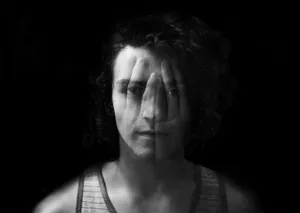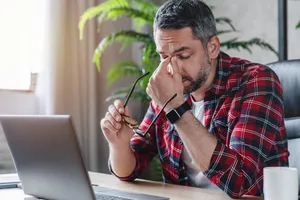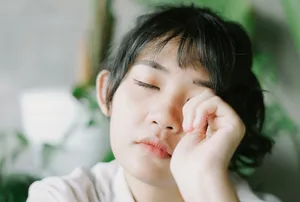Why poor sleep can cause depression
Dr. Christine Blume | 21.03.2023

The background and tips to prevent mood disorders.
Everyone has experienced it at some point – a sleepless night and the mood is in the dumps the next morning. We are grumpy, irritable, and every effort strains our nerves. Occasionally, we handle such nights well, but if they accumulate, they can promote the development of depression or anxiety disorders. Consistently poor sleep puts the body in a state of stress, causing a multitude of processes to become unbalanced.
Hormones out of balance
The hormonal balance is particularly affected. An increased release of the stress hormone cortisol leads to a continuous overactivation of the hypothalamic-pituitary-adrenal axis *. Numerous studies have shown that this altered regulation is significantly related to the development of a depressive disorder [1]. The "happiness hormone" serotonin, which is also involved in the regulation of the sleep-wake cycle, also plays an important role in this context. An imbalance in serotonin metabolism can also contribute to depressive moods [2]. Additionally, impaired communication between certain areas of the brain can affect the response to emotional stimuli, triggering overwhelm and overreactions.
* Hypothalamic-pituitary-adrenal axis: A complex regulatory circuit between the three hormone glands hypothalamus, pituitary gland, and adrenal cortex, regulating numerous body functions and reactions (stress reaction, digestion, immune system).
Of course, other hormones, neurotransmitters, and psychological processes are also involved in the development of anxiety disorders and depression, and poor sleep does not always precede the illness. The reverse development path is also possible: an existing depression or anxiety disorder can cause or trigger sleep problems. In fact, about 90 percent of people suffering from depression are also affected by insomnia [3].
Social life suffers
Poor sleep also affects social interactions. Those who sleep poorly tend to avoid others, isolate themselves, and feel lonely. This again promotes a depressed mood because positive experiences and social support from others are lacking. Conversely, sleep-deprived people are perceived by outsiders as socially less appealing, leading to social interactions being avoided. Thus, the social isolation of poor sleepers is further reinforced [4]. Social withdrawal and loneliness are significant risk factors when it comes to the development of depression. Therefore, it is essential to escape this vicious cycle.
Exercise – and put the mobile phone away!
Initially, it makes sense not to take naps during the day. There is evidence that such naps can negatively affect the mood of people suffering from depressive moods. Also, spending a lot of time in front of the TV, computer, or mobile phone seems to negatively impact the mood [5]. So it's better to limit the use. What positively affects the mood is – unsurprisingly – exercise. As research shows, regular physical activity has a positive effect, lifts the mood, reduces anxiety, and enhances well-being by releasing the body's own endorphins *. At the same time, it also improves sleep quality [6].
* Endorphins: Body's own substances that have both pain-relieving effects and enhance feelings of happiness and can lead to euphoria. Colloquially referred to as happiness hormones.
Sleep² Tips:
- Spend a lot of time outdoors and in daylight, and try to be physically active during the day. A walk sometimes works wonders!
- Avoid naps and be mindful of your internet and TV consumption
- Make sure, even if it's sometimes difficult, to spend enough time with people and not to "withdraw" despite the fatigue.
Test sleep² now and learn to sleep better!
To the sleep² appSources:
- Keller, J., Gomez, R., Williams, G., Lembke, A., Lazzeroni, L., Murphy, G. M., Jr, & Schatzberg, A. F. (2017). HPA axis in major depression: cortisol, clinical symptomatology and genetic variation predict cognition. Molecular psychiatry, 22(4), 527–536.
- Albert, P. R., Benkelfat, C., & Descarries, L. (2012). The neurobiology of depression--revisiting the serotonin hypothesis. I. Cellular and molecular mechanisms. Philosophical transactions of the Royal Society of London. Series B, Biological sciences, 367(1601), 2378–2381.
- Tsuno, N., Besset, A., & Ritchie, K. (2005). Sleep and depression. Journal of Clinical Psychiatry, 66(10), 1254-1269.
- Simon E.B. & Walker M. (2018). Sleep loss causes social withdrawal and loneliness. Nature Communications, 9: 3146
- Choi K.W., et al. (2020). An exposure-wide and mendelian randomized approach to identifying modifiable factors for the prevention of depression. Am J Psychiatry, 177(10), 944-954.
- Singh N.A., Clements, K.M., & Fiatarone M.A. (1997). A Randomized Controlled Trial of the effect of exercise on sleep. Sleep, 20(2), 95-101.




